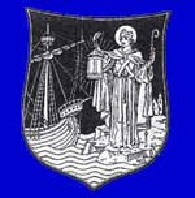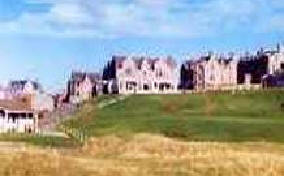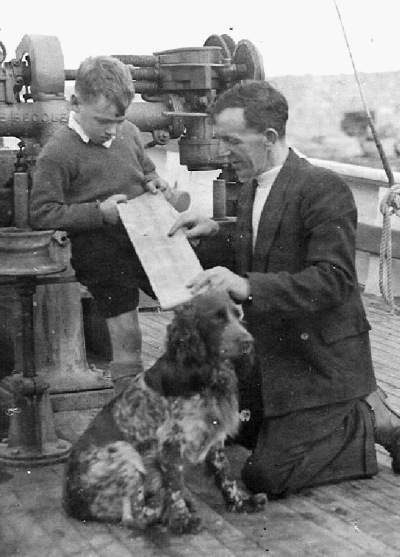|
Beside yon straggling fence that
skirts the way,
With blossomed furze unprofitably gay,
There, in his noisy mansion, skilled to rule,
The village master taught his little
school.
A man severe he was, and stern to view;
I knew him well, and every truant knew:
Well had the boding tremblers learned to trace
The day’s disasters on his morning face;
Full well they laughed with counterfeited glee
At all his jokes, for many a joke had he;
Full well the busy whisper, circling round,
Conveyed the dismal tidings when he frowned.
Yet he was kind, or if severe in aught,
The love he bore to learning was in fault.
But past is all his fame, - the very spot
Where many a time he triumphed, is forgot.
Oliver Goldsmith The Deserted Village
It was probably indicative of my detached
attitude throughout the ten years I spent at school, that on the first
day, as a five year old, being taken up the hill for enrollment and
commencement, I asked my mother where we were going. “To school of
course!” she responded with some astonishment at the question. I
obviously had no idea that it was a significant occasion. Under the
tutelage of a fine friend and neighbour of the family, Miss Grant, I was
treated gently during the two years of the infants class.
It was the only class in which I won a prize – third,
one year. (A fellow pupil later reminded me I was only “third-equal”).
In the class were a number of pupils that were to become lifelong
friends. Most were to stay much of their lives in the locality, but a
few like myself travelled farther afield.

The logo and motto of our school and town.
It says per noctem lux, - light through the night, - and depicts a
legendary monk,
Saint Gerardine, who is said to have patrolled the beach at night with a
lamp
to guide boats safely to shore at Stotfield and Lossie.

Moray Golf Clubhouse and Stotfield Hotel, Lossiemouth
We started writing and
drawing practice with slates. Pencils and paper were in short supply
after the war. Later we used nib-fitted pens and wrote from ink mixed
in the class. The nibs were of poor quality and it took real skill to
produce beautiful work. Some pupils did, but I was never among them. A
small bottle of milk was provided daily to each pupil by the new Labour
Government of Clement Attlee. This provision was to continue until
stopped by Margaret Thatcher after she became Education Minister under
Edward Heath in the early 1970’s. Reading books and textbooks were few
and old. For the first six or seven years of my schooling, we used
well-worn and well-thumbed books on geography, history, literature and
mathematics. The geography books stick in my mind. There were hazy
black-and-white pictures with subjects and titles like, “bicycles in a
Bangkok street; sampans and house-boats in Hong Kong; Russian peasant on
the steppes; cocoa plantation in Africa; camels in the Sahara desert;
reindeer sleighs in Lapland; and so on. I guess those texts must have
been published just prior to or just after the First World War.
But the reading books
were good and more memorable. They had some classic essays, stories and
poems. I recall being captivated by short simplified tales from Hans
Christian Anderson, the Grimm brothers, Booker T Washington, and James
Barrie, as well as the poems of Wordsworth and Stevenson. At home I
became an avid reader of Arthur T Mee’s marvellous Children’s
Encyclopaedia which had an incomparable selection of such material.
Stevensons poems, (A Child’s Garden of Verses) touched me at an early
age. Other poems I was drawn to included one by James Hogg, the
“Ettrick Shepherd”. I used to think his ‘Billy and Me’, was written
especially for myself and my older brother Billy:
Where the pools are bright and deep,
Where the grey trout lies asleep,
Up the river and over the lea,
That’s the way for Billy and me.
Where the blackbird sings the
latest,
Where the hawthorn blooms the
sweetest,
Where the nestlings chirp and flee,
That’s the way for Billy and me.
Where the mowers mow the cleanest,
Where the hay lies thick and
greenest,
There to track the homeward bee,
That’s the way for Billy and me.
From the infants section
we moved up to the primary classes at the age of seven. There was a
shortage of trained teachers then, few having been produced during the
war years. So a number of former teachers were brought back from
retirement to fill the gap until more could be trained. The first two
years of primary school we had such teachers. No doubt they had been
competent and inspiring in their day, but they were of an age that found
boisterous 7 and 8 year-olds somewhat irritating. To add to the misery,
they taught by rote which was a dull procedure. We recited
multiplication tables in a sing-song voice for seemingly hours on end.
The process drummed the facts into us, but I am glad my grandchildren
are spared that experience. The strap and the cane were widely used and
liberally applied. It would not be countenanced today, but my
recollection is that excess use, though it did occur, was mercifully
limited. We moved from the bungalow (which I loved), in early 1948, to
a draughty 4-bedroomed semi-detached house facing the sea. That year my
father’s boat was sunk in the Firth of Clyde. It was not the happiest
of years.
After my ninth birthday
we moved up a further class at school, and were blessed with one of the
first of the cadre of post-war trained teachers. She was young,
pleasant, attractive and easy-going. For the next year, school was
sheer bliss under Miss Boyne from Nairn who was all that a teacher
should be. She was later to marry one of the Baxters of Fochabers, (the
Speyside food processors), so I think her teaching career was not so
long, which was a pity for other pupils. I was privileged to meet up
with her 54 years later in a local residential home. She still had that
beautiful smile and winsome personality. And despite her failing health,
she was as cheerful and uncomplaining as ever. I was serving in
Indo-China when she died, and was heart-sorry at being unable to attend
her funeral service and pay my respects as a grateful former pupil.

With my father and our faithful spaniel dog, Banvie. My Dad is
explaining to me an echo-gram recording from the boat’s sounder. |

